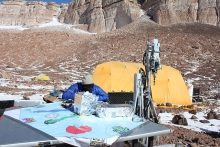"It doesn't mean there's no life on Mars, but what it does mean is it's going to be harder to find," said Jacqueline Goordial, the McGill University researcher who led the study, in an interview with Rachelle Solomon on CBC's Breakaway.
"It doesn't mean there's no life on Mars, but what it does mean is it's going to be harder to find," said Jacqueline Goordial, the McGill University researcher who led the study, in an interview with Rachelle Solomon on CBC's Breakaway.

Natural Resource Sciences professor Lyle Whyte and postdoctoral fellow Jackie Goordial talk about their research which suggests that it is unlikely that it is unlikely that there is any microbial life to be found on Mars.
By Katherine Gombay, McGill Newsroom
Failure to find active microbes in coldest Antarctic soils has implications for search for life on Mars
The results of a recent experiment at the Canadian Light Source (CLS) synchrotron in Saskatoon could be a key piece in the quest to discover if there was ever life on Mars.
Lyle Whyte, an environmental microbiologist at McGill University who is originally from Saskatchewan, specializes in organisms that can survive in extreme cold.

Insecticides that are sprayed in orchards and fields across North America may be more toxic to spiders than scientists previously believed.

Even jumping spiders have personalities scientists have discovered. A "shy" individual will not make the same choices as a "bold" individual. This means that some individuals, because of their personality type, will capture more prey than others, and will therefore have a larger effect on local ecosystems.